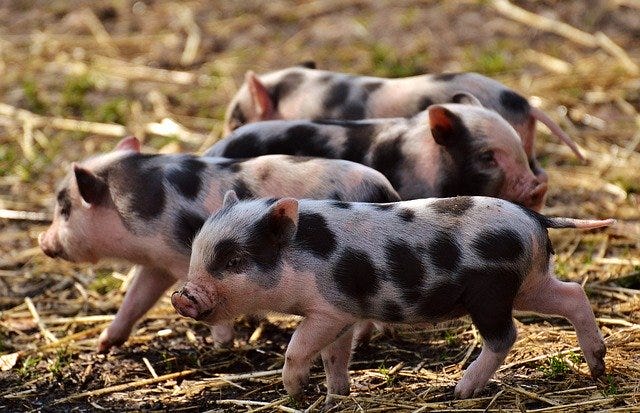The tagline for my Death By Tech blog is “Mostly tech. Lots of Linux. Some fiction. A few dogs. The ramblings of a career sysadmin working in infosec.” This is one of those posts that definitely fit into the “rambling” category. There's not much tech here, but I hope you enjoy it anyhow.

I am not a very political person. I find life is full enough that I don’t really have the desire to follow our politicians very closely, or create a deep understanding of who is who in our government other than knowing which party is in power and the identity of my local representatives. But, like everyone else, there are periods of time when I become more focussed on politics because of something that is happening at the time. The Coronavirus pandemic is one such thing, and I have been paying closer attention to our politicians and government during these days. With that heightened awareness comes exposure to some ideas and processes that I normally don’t think about. Namely, how my closest neighbour, the United States is faring through the pandemic.
The way that the United States has been handling the pandemic has caused me to pay more attention to the US overall, not just the pandemic stuff. And part of the reason that the US was slow to bring in measures, and basically denied it was even an issue in the early days, is because taking action would have an economic impact. Even today, with the US having 1/5 of the total global deaths, the US is still worried about the economic impact of keeping the economy closed down and how that will affect the November election.

We’re all well aware that the U.S. is the poster child for capitalism. Businesses rule the country, even more so now during this time because of the incumbent POTUS, and lobby groups and industries, as well as private billionaires, funnel massive amounts of cash into the coffers of politicians who will push their agendas. Politicians and industries are willing to completely gut working systems putting the country at a permanently high risk of collapse as we’ve seen from the 2008 sub-prime mortgage fiasco, and the seemingly unstoppable rise in the US debt. The country seems to be on a crash course to an economic crater to me, but I am neither an economist nor in possession of any other skills to make that call with certainty. But what I do have is a lot of curiosity and I started thinking about how the U.S. ended up like this.
How did it go from the beacon of freedom in the world so loved that France sent a statue (a remarkable feat even today) to a country that seriously considers just letting the elderly die than risk damaging the economy? That’s an incredible fall from grace and it’s hard to fathom. But, every big thing is comprised of small things. And the first few steps that began this journey to extreme capitalism may have involved a pig.
The parable of the pig
We all understand that money is ephemeral storage - it’s a temporary place to store value. Prior to money, there was no way to store value. If I had a wheelbarrow and I wanted a pig, I'd have to find someone with a pig that wanted a wheelbarrow. That does not scale well but it was the only way to do things because, at that time, the intrinsic value of an item was the only value it had.
But either side of that transaction does scale when the transactions are decoupled. There are many more people who individually want a pig or who want a wheelbarrow than there are people who want a pig and also have a wheelbarrow to trade for said pig. To free up the vale of that wheelbarrow prior to finding that pig guy who also wants a wheelbarrow, we need money.
Money allows the wheelbarrow guy to sell his wheelbarrow to a guy without a pig and temporarily store the wheelbarrow's value in money until the pig guy comes along. He can then release that stored wheelbarrow value that is currently stored in money to the pig guy and finally get his pig.
This is good because it allows the wheelbarrow to be put to use by someone now instead of sitting around collecting dust waiting for pig guy. The problem arises when the other sellers at the market who do not sell pigs realize that wheelbarrow guy, now bereft of his wheelbarrow, has money in his pocket. The sellers start to focus on wheelbarrow guy and entice him to buy their wares with that money.
Wheelbarrow guy starts to think that he doesn't need that pig after all. He needs that thing that the merchant is holding up right here in front of him at the market. That thing that he can easily buy with his stored wheelbarrow value right now instead of the eventual pig seller that may never come along.
The merchants are less interested in wheelbarrow guy’s needs or well-being than they are about moving that money from his pocket to theirs. Somewhere in there are the seeds of capitalism. When the reason for the market changes from the exchange of goods to the collection of wealth, that is where capitalism gets a foothold and survives.
I’m not suggesting that we go back to bartering. The existence of temporary ways to store value helps a lot. But it goes awry when storing value temporarily turns into hoarding wealth for no particular purpose.
I’m not sure if this makes sense. Heck, I am not even sure this is a parable. But it has some truth to it and we’re seeing what happens to a country that has lost its way and seeks only to hoard wealth rather than trying to operate a legitimate market to facilitate peoples’ needs. The impact of successive governments that deprioritize the health of its citizens in favour of supporting the hoarding of wealth by other citizens far outpaces mere economic concerns. We’re seeing an example of this now in the US. One of the most advanced countries in the world has the largest number of infected people and is overwhelming its healthcare system in many places because commerce is the critical care patient in the US, not the people.












Share this post